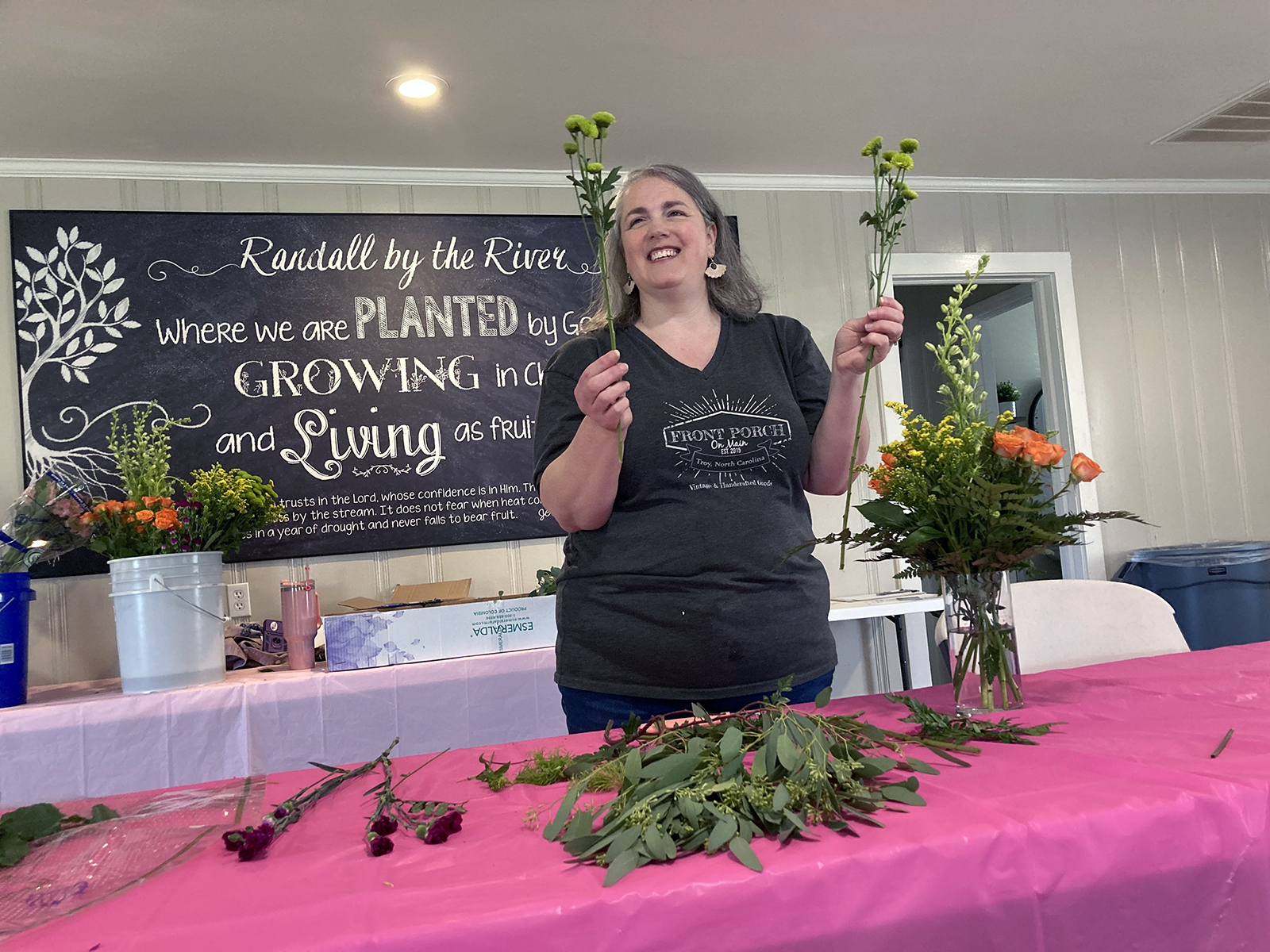
Melanie Nichols, a florist instructor from Troy, North Carolina, leads a flower arrangement class, Saturday, April 13, 2024, at Randall by the River in Norwood, North Carolina. (RNS photo/Yonat Shimron)
NORWOOD, N.C. (RNS) — With pruning shears in hand, 13 women gazed intently at the composition of alstroemerias, roses, carnations and eucalyptus branches they had carefully propped up in glass vases during a flower arrangement class on a recent Saturday.
The one-hour class, inside a renovated church hall, was one of the monthly “bridge” sessions offered by a United Methodist congregation to anyone living in this small town along Lake Tillery, about an hour’s drive from downtown Charlotte.
Of the 13 participants, only three were church members, though a few others had attended once or twice. Melanie Nichols, the florist instructor, made her way to each one, offering tips.
“Pull off those extra leaves growing around the base of the flower,” she advised one.
“If you place it at an angle, it helps open up your arrangement,” she recommended to another.
The church, Randall by the River, is trying something new.
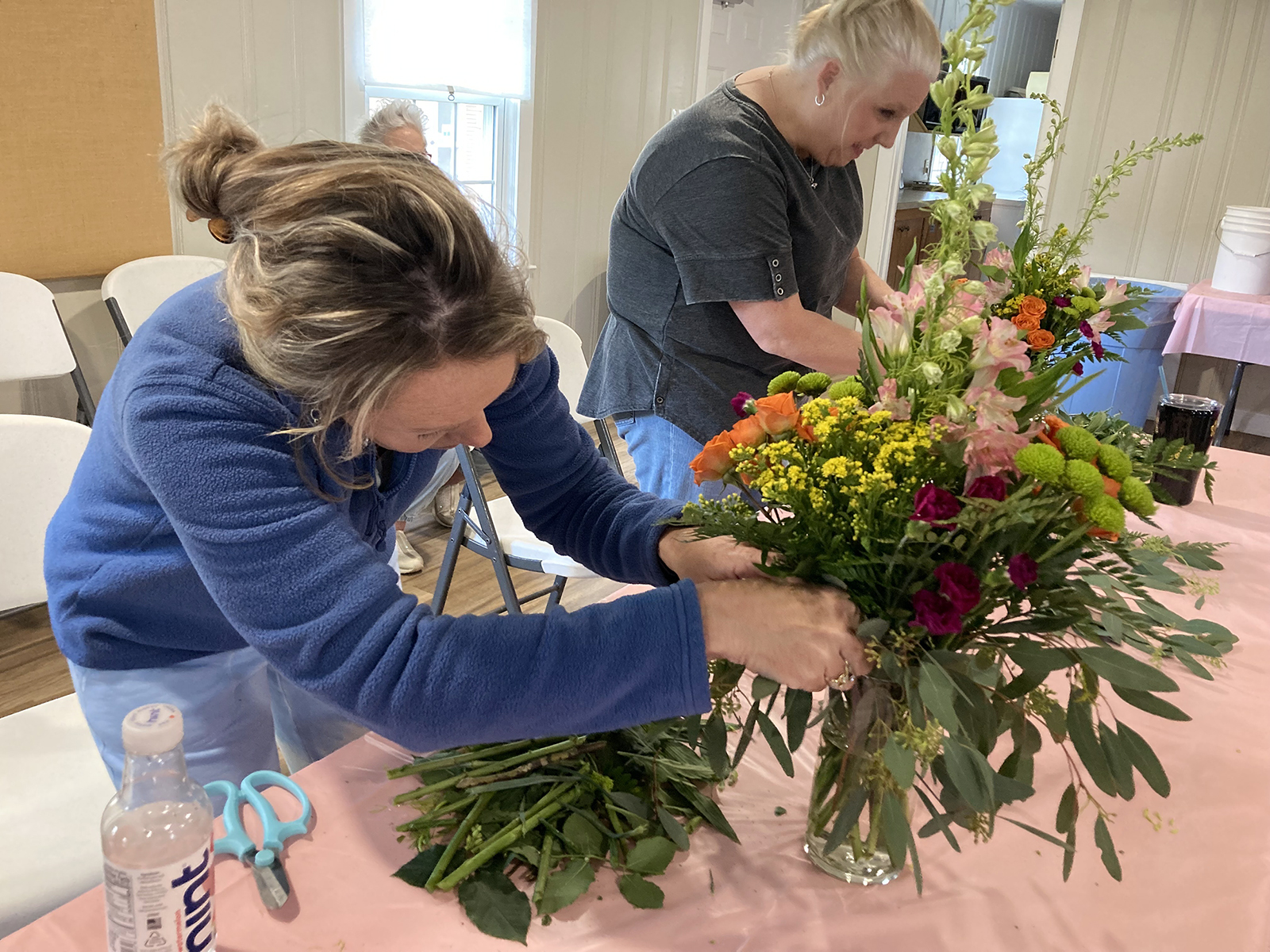
People participate in a flower arrangement class, Saturday, April 13, 2024, at Randall by the River in Norwood, North Carolina. (RNS photo/Yonat Shimron)
Over the past year, it has offered numerous skill-building classes such as assembling charcuterie boards, baking dog treats, playing pickleball and decorating Christmas trees.
“Our only goal is to create community and we do that through classes,” said the Rev. Hanna Barlow, the pastor.
The classes are part of what the United Methodist Church called “Fresh Expressions,” a denominational initiative intended to connect people who may not be interested in church but are interested in learning a new skill or making new friends.
The Western North Carolina Conference of the United Methodist Church has nearly 200 of these groups, started by laypeople or clergy around various non-church interests: There’s a canoeing and paddling group in Bryson City, a hiking group in Asheville, a disc golf group in Hendersonville, a weekend breakfast gathering for flea market enthusiasts in Canton. United Methodist conferences in Florida and Georgia are also actively promoting the initiative.
Fresh Expressions emerged within the Anglican and Methodist churches 20 years ago. The concept has since spread to many other Protestant denominations and has been pushed by bishops of several regions of the United Methodist Church.
Like all other Protestant denominations, the United Methodist Church has suffered a steep decline in membership, losing about a quarter of its membership just in the past five years, partly driven by theological dispute over LGBTQ ordination and same-sex marriage. But it is also seeing a larger societal decline as fewer people attend church and even fewer consider religion a core part of their lives. Only 24% of Americans say they attend church weekly, a PRRI study found, and only 15% describe religion as the “most important thing” in their lives.
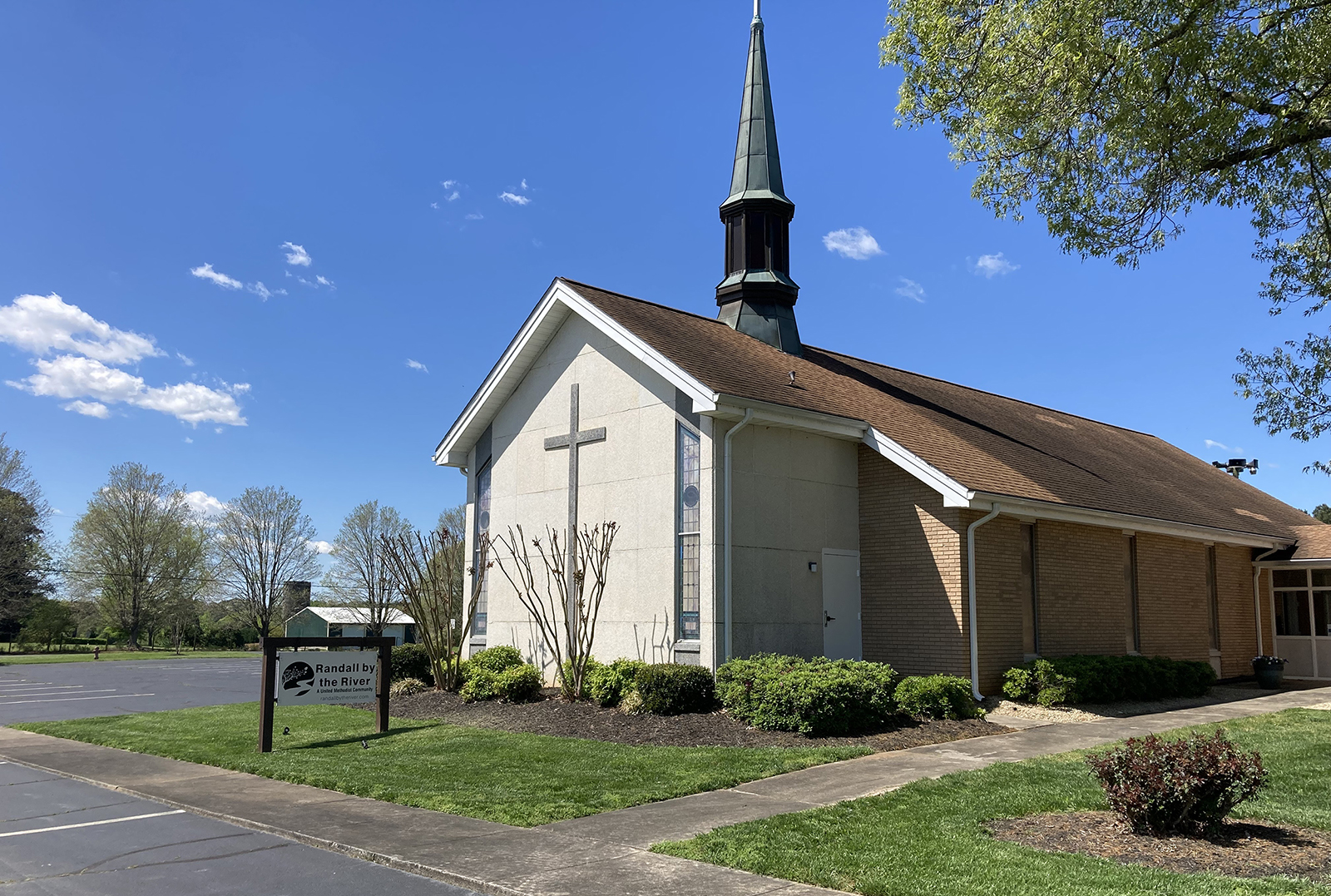
Randall by the River in Norwood, North Carolina. (RNS photo/Yonat Shimron)
RELATED: Study: Unaffiliated Americans are the only growing religious group
“Churches are sensing that if we don’t try something different, we’re going to lose connection with our communities,” said the Rev. Luke Edwards, associate director of church development for the Western North Carolina Conference of the United Methodist Church. “Fresh Expressions is a way for churches to still be a spiritual home for their neighbors, but in a less institutional way.”
Randall by the River is a case study. The church, formerly known as Randall United Methodist, is the oldest church in rural Stanly County. In the early 1800s, it was visited by circuit-riding evangelist and Methodist pioneer Francis Asbury.
While it was always small, it had dwindled to only about a dozen members a few years ago. That’s when members undertook a survey to determine what kind of ministries it could initiate to bolster its reach. Like many churches, it had considered a feeding ministry as a way to serve its neighbors. But the study showed that the lakeside community around the church was well-off. Few were experiencing poverty or hunger.
Instead the study pointed to another need: loneliness.
“We realized a lot of the people who live here full-time around that two-mile loop had not grown up in the area, so a lot of what we were hearing was that people were immensely lonely,” said Barlow, the church pastor.
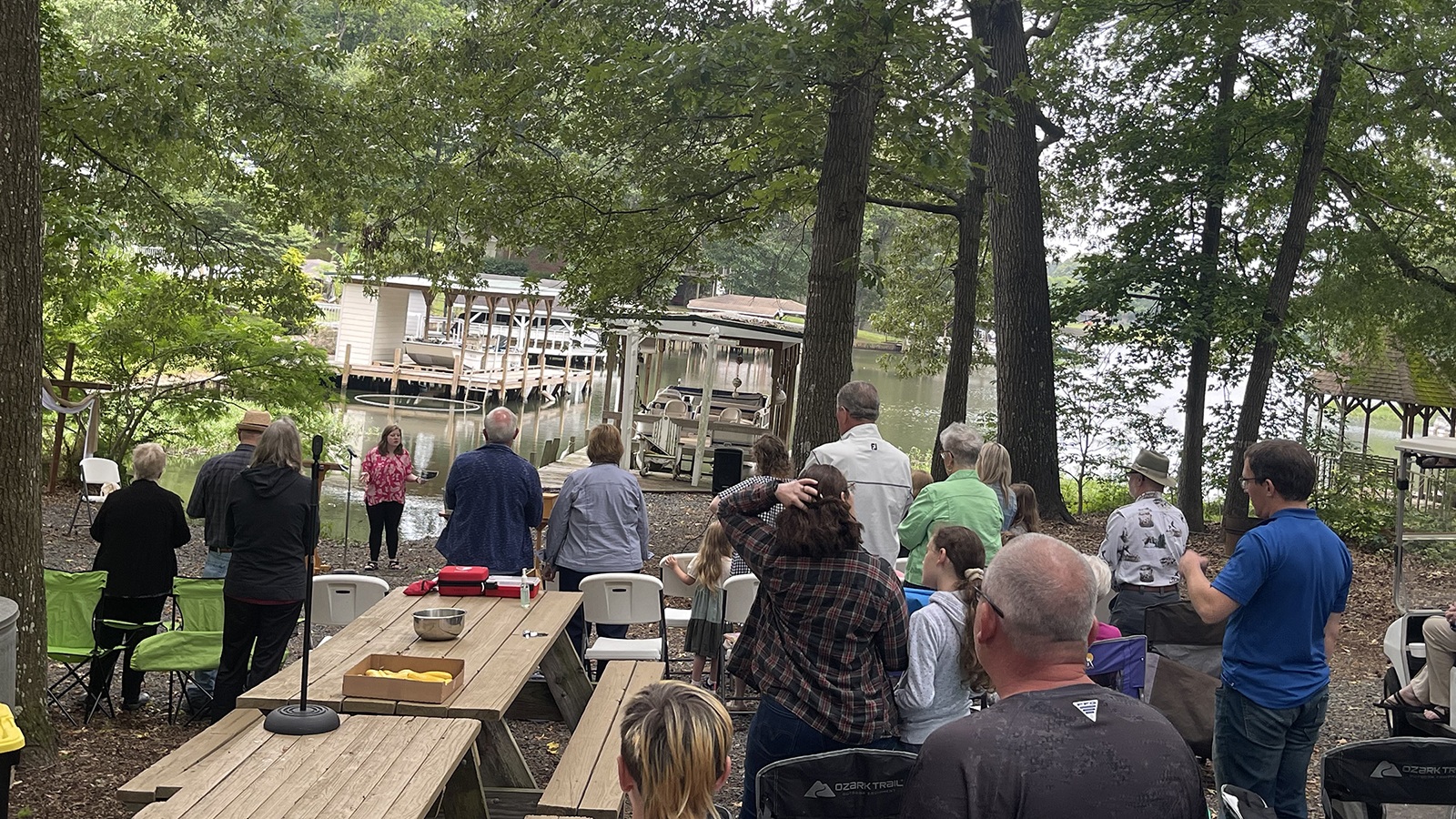
Randall by the River, a United Methodist church near North Carolina’s Lake Tillery, holds Sunday services on the lake during the summer. The Rev. Hanna Barlow is pictured facing the congregation. The church takes part of a movement called Fresh Expressions that tries to create communities outside of the church. (Photo by Joshua Barlow)
Even before the study, the church had found some success with its Sunday services on the lake. Between Memorial Day and the end of September, church members prop lawn chairs in a wooded lot overlooking the lake or steer their boats to the dock and partake in the service from there. This past year, church leaders added a paddle-board and kayak activity before the Sunday morning service.
“That’s really how we came up with the name Randall by the River,” said Beth Hinson, a member. “We wanted to differentiate ‘lake church’ from ‘traditional church.’ And two years ago, we just decided to change the name of the church legally.”
It also changed the name of its fellowship hall to the “Branch Community Center” and started offering classes every other month. This year it wants to add a hiking club and movie night.
The church has grown to 65 members. Lakeside services typically draw about 50 people. The classes typically draw 15. But Barlow, the church’s first full-time pastor, said the goal of the Fresh Expressions initiative is not to grow the church.
“Are we getting to know people’s names? Are we introducing ourselves and being hospitable? That’s really the only goal of success that I have,” she said.
Fresh Expressions is not entirely secular. Organizers would like to help draw people into a spiritual, and preferably Christian, fellowship, but they don’t expect that people will necessarily find it in church.
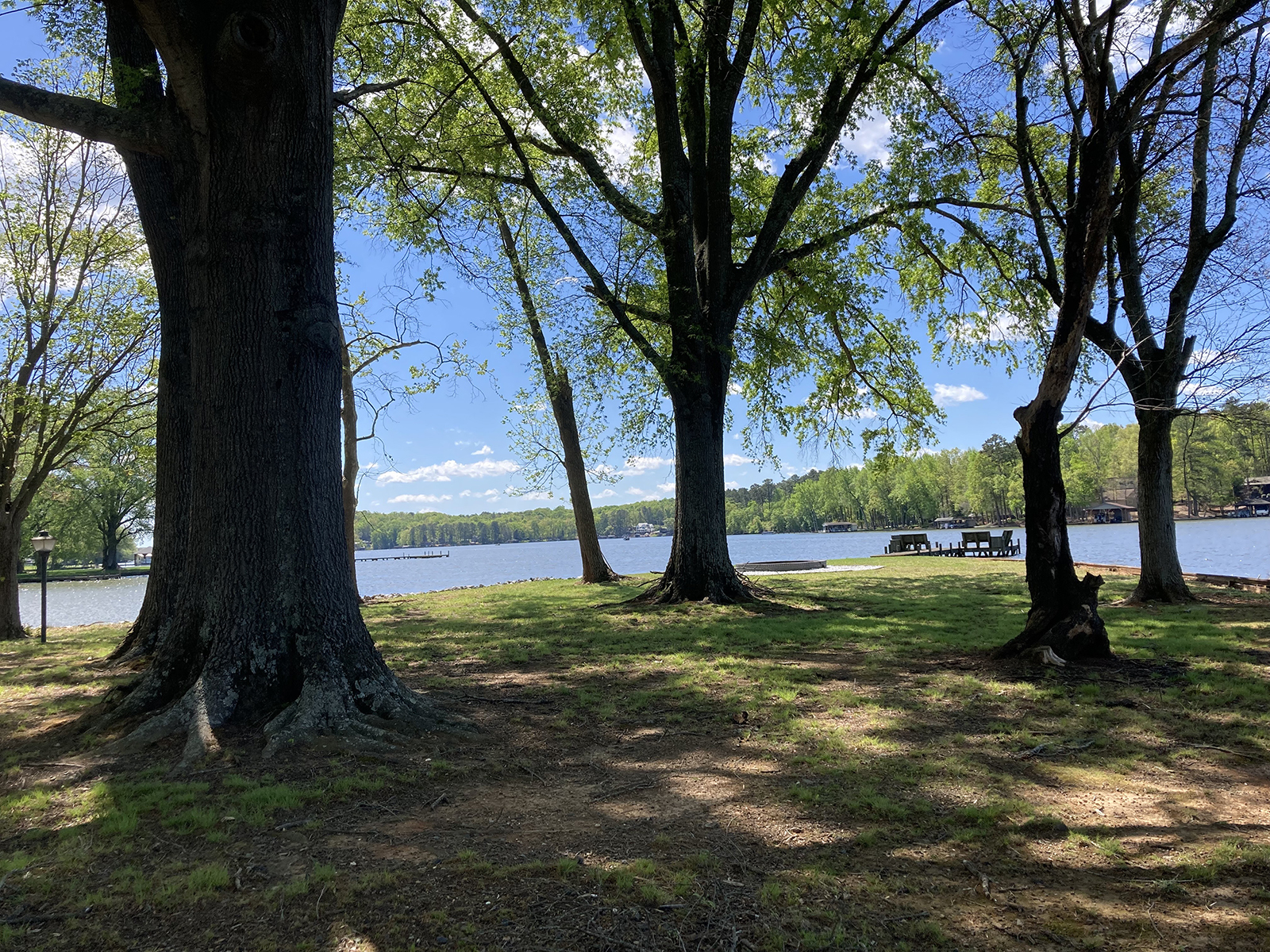
Randall by the River holds Sunday services on Lake Tillery between Memorial Day and Labor Day. (RNS photo/Yonat Shimron)
“We’re really intentional about it not being a kind of bait-and-switch type of movement, but just a movement of offering social community for our neighbors,” said Edwards. “If we find that there’s an openness to spiritual conversations, then we’ll move into that area, and if there’s not, then we’ll stay with this kind of social connection.”
Nevertheless, Barlow, the church pastor, ended the flower arrangement class with a voluntary one-minute prayer, thanking Nichols, who runs an antique shop, for leading the class and wishing God’s peace on all the participants.
“I pray that you be with each of us as we go from this place,” Barlow said as participants stood in a circle. “Help us find calmness and peace.”
Then the participants each took their newly created flower arrangements home.
RELATED: The Bible suggests even God gets lonely. Why don’t religious people talk more about it?




